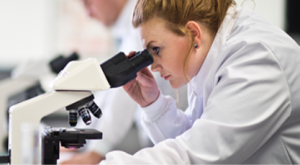Ian Davies, lecturer in Biomedical Science and course leader for Healthcare Science, has just been selected to be part of the Q Community – a diverse and growing community of professionals with experience and understanding of improvement and committed to improving health and care across the UK.
Founded by the Health Foundation in 2013 and supported by NHS Improvement, Q (which stands for Quality if you haven’t guessed) is a community of frontline staff, managers, researchers and policymakers who share a common aim in developing a critical mass to accelerate improvements to the quality of care.
Although a common public perception of healthcare centres around nurses and doctors, as Ian explains biomedical and healthcare scientists play a vital contribution to patient care throughout the NHS:
“Biomedical Scientists and the wider laboratory medicine and clinical science workforce undertake around 900 million tests each year in the UK and it is estimated that 70% of all diagnoses are reliant upon their work. From the diagnosis of cancer and diabetes to the monitoring of treatment and the preparation of blood transfusions we work across all clinical specialities and follow patients’ journeys from their initial visit to  the family doctor, through their hospital treatment and, where necessary, through to specialist tertiary treatment centres”.
the family doctor, through their hospital treatment and, where necessary, through to specialist tertiary treatment centres”.
From identifying sepsis and dehydration to informing decisions to discharge patients Ian explains that the clinical laboratory is an essential element of front line care: “the integration of laboratory medicine into all clinical pathways is essential; there needs to be continual dialogue between all stakeholders – clinicians, scientists, carers and patients to ensure that the maximum value is gained from laboratory tests”.
“For years laboratories have evolved highly developed quality management systems to ensure that all results are accurate and precise but much more work can be done to optimise their clinical value. I am keen to promote and develop the notion of diagnostic stewardship – making sure that the right test is done on the right patient at the right time and that the result is interpreted in the right way”.
Biomedical scientists are an inquisitive, resourceful and resilient workforce and as a connected university, with connections across healthcare and within the academic expertise of the university Ian is hoping that the Q community will provide an opportunity to integrate these attributes to promote quality improvement and innovation.
Through Q, people who understand how to make services better are pooling their knowledge and energy with a focus on achieving practical, measurable improvements in health and care. To borrow the words of the 18th century art critic John Ruskin – “Quality is never an accident; it is always the result of intelligent effort”.
You can find more information about our Biological and Biomedical Science Courses at:
http://www.staffs.ac.uk/undergraduate/subjects/biological-and-biomedical-sciences/

